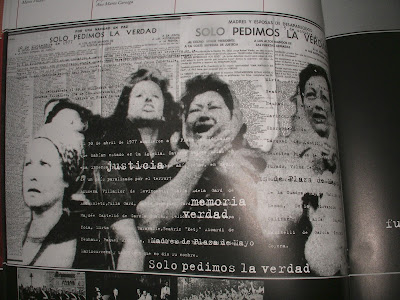Week 3
Wednesday 24, 2013
Today, I visited “The Association of
Former-Detainees and Disappeared” where I met with a group of 4 former
detainees- three men and one woman. First, they explained to me the reasons
they had to form a group and the goals of the organization. It is very
interesting and moving to know that all of them share a common experience. They
all were taken illegally from their families, detained for a long time,
tortured and finally released without a legal reason. It was also sad to hear
the stories they told me about their captivity and life in prison. Their stories
gave a vivid idea of what their life was like and the things they had to do to
survive. It was equally sad and inspiring to see how such a terrible experience,
being a former-prisoner, gave them the reason to form a deep friendship that
goes back more than 20 years.
Another piece that
they shared with me are ideas about how things have changed since the last
dictatorship. It was very embarrassing to hear their perspective on what my
adopted country “the U.S” did, not only during the dictatorship but also after,
to control politically and economically Argentina and the region in general. One person in particular I met was Osvaldo
Ramos who agreed to be interviewed by me the next day.
Thursday 25
Today, was one of
the saddest moments of my journey. I spent several hours with Oswaldo Ramos (a
former prisoner and an active member of the association). He is the person who
I met yesterday. Today, we spent several
hours alone and he told me his story: In 1978, he and his young wife were
kidnapped by the police in the middle of the night. He described in detail to
me the mechanisms of psychological and physical torture that they experienced during
their captivity. It was shocking to me to hear part of his experiences as
prisoner. I had read many similar testimonies; this was the most powerful, because
the person was in front of me! It was so painful to hear his story and his wife’s. I saw for the
first time how this could really happen to anyone and it scared and horrified
me. (I
am not including this interview out of respect for him and his wife, but I
will edit it and include excerpts of his account in my class next year).
One of the most
amazing facts about Osvaldo, however, is that after he was released in 1979, he
was one of the first victims that spoke out against the dictatorship. It was an
honour to met him, because he was one of the victims who testified against the
former “Jefe de la junta- Videla” (Dictator of Argentina 1976-1981) who was later
condemned for war crimes.
One last thing
that impressed me about him was to hear that he is no longer angry for what his
government did to him; instead he is driven to help others in the same
situation around the world.



